Mixo: What is It and a Detailed Review [2025]
Editorial Note: We earn a commission from partner links. Commissions do not affect our editors' opinions or evaluations.
Updated December 14, 2024
Published September 12, 2023
![Mixo: What is It and a Detailed Review [2025]](https://cdn.sanity.io/images/isy356iq/production/9fe2701f3cf5613e8911e3acbc20a4c64d1bdbf8-1200x800.png?h=260)
Our Verdict
Based on our in-depth Mixo review shows that it is a superb AI website launcher ideal for growing businesses and startups. It’s an easy-to-use platform and requires no coding, enabling non-tech-savvy users to build their site for product launches, beta programs, and more.
On its free version, the platform can quickly create customizable websites, provide an SSL certificate for your site, and even host your site via Mixo’s servers once you publish it. However, it lacks advanced website customization features, like adding designs and app integrations.
Best For
Startups and SMBs
Pricing
Free to $39/mo.
Discount
Annual billing (20% off)
Pros
- Easy-to-use
- Quick AI-driven Website Builder
- Allows website customization
- Offers subscriber acquisition and feedback tools
Cons
- Limited app integrations
- Lacks advanced website creation features
Ease Of Use
4.8
Value For Money
4.4
Features
4.5
Speed
4.5
What is Mixo?
Mixo is an AI-driven website builder for your solo entrepreneurs and growing businesses. It offers quick website launching, landing page creation, and customer feedback tools (email and survey forms) for businesses that want to gain insights about their new product. They also provide SSL certificates on all generated sites and site hosting services.
Is Mixo Right For You?
We recommend Mixo for your projects if you need the following:
- You need fast landing page creation with the help of AI.
- You want to create a site without needing to code or input designs.
- You want to create multiple site pages with simple, AI-generated designs.
- You need subscriber management and customer feedback tools for your site.
Mixo may not be suitable for users who:
- You want to launch your own site manually and have the technical skills.
- You want to have more control over designs of your site.
- You want advanced site functionalities and integrations that Mixo cannot provide.
Pros & Cons of Mixo
Pros
Quick AI-driven website builder
Mixo can build a well-designed landing page in a few minutes with AI using a detailed prompt or description of your site.
Easy-to-Use
Mixo’s site creation, customization, and subscriber management tools are easy to use, allowing non-techy users to create their sites efficiently.
Allows website customization
While AI initially generates all site designs, users can customize elements on the homepage, the site’s SEO title, and meta description.
Free SSL certificate for all generated sites
Mixo grants free SSL certificates for all generated sites—even for free users. This keeps user data secure and verifies site ownership.
SEO-friendly Site for all devices
Mixo’s AI-generated sites are considered SEO-friendly for desktop and mobile platforms.
Offers subscriber acquisition and feedback tools
Mixo allows users to create a landing page with signup and survey forms to get business insights directly from users about their new product.
Cons
Limited app integrations
Compared to other AI-powered website builders like Unbounce and LeadPages, Mixo has only limited app integrations.
Lacks advanced website creation features
Since Mixo is primarily designed to create simple landing pages, it lacks tools for advanced website creation.
What Sets Mixo Apart
Compared to its competitor AI website builders like Unbounce, Launchrock, and LeadPages, Mixo can quickly produce your website using AI. It’s also extremely user-friendly since it requires no technical skills for website creation, like coding and design. However, Mixo lacks advanced site-building features, like a drag-and-drop interface and integration with e-commerce platforms.
Key Features
As an all-in-one AI website builder, here are Mixo’s best features:
AI-powered Website Creation
Mixo uses AI and NLP algorithms to generate your website using your startup idea or product. After a few minutes, the tool will preview the AI-generated landing page. For instance, we’ll create a website about a food and dining website with monthly newsletters:
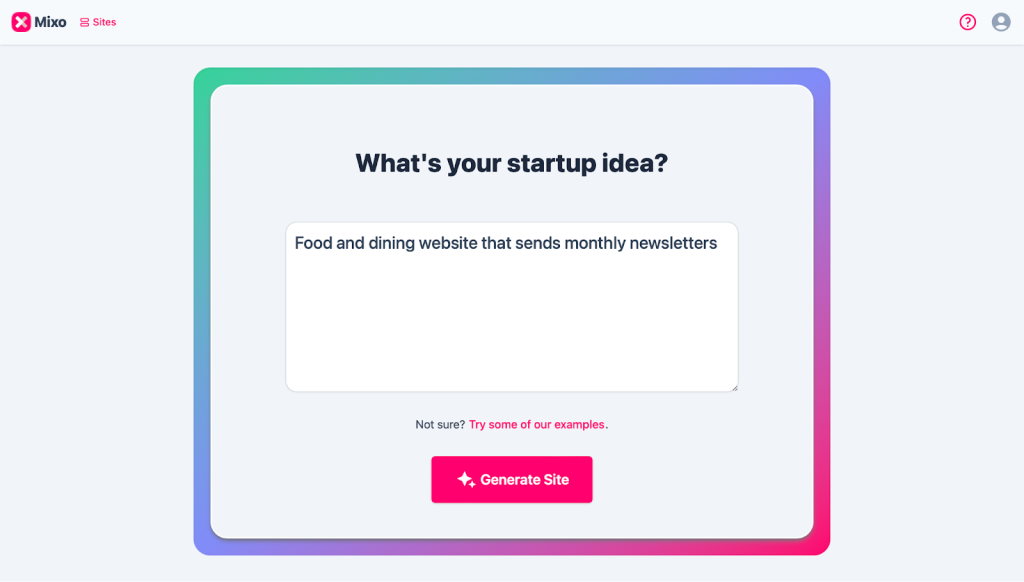
The generated site will feature testimonials, relevant images, and a signup form on the landing page. Your site will also have an SSL certificate for security and will be hosted by Mixo’s Global Content Network servers:
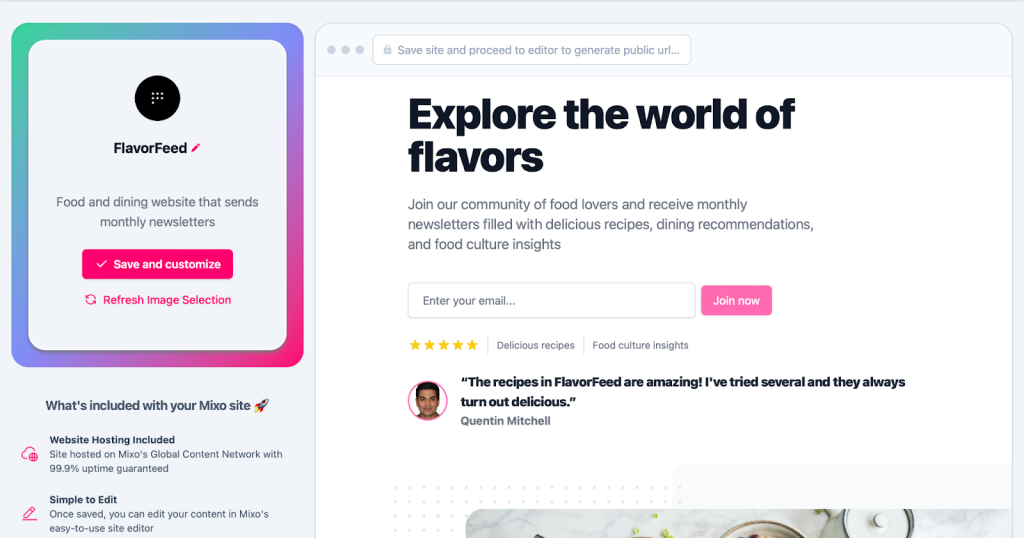
We liked this tool’s ability to generate a well-designed site using AI in a matter of minutes. Mixo provides SSL certificates and site hosting for its generated websites, even on its trial version.
Pages and Site Settings
Once you’ve saved the site, you can now customize its landing page using the Pages tool; you can change the elements (title, images, ratings, and reviews), add relevant keywords on the hero section to make it more SEO-friendly, and set up a signup form to gain leads and feedback from customers:
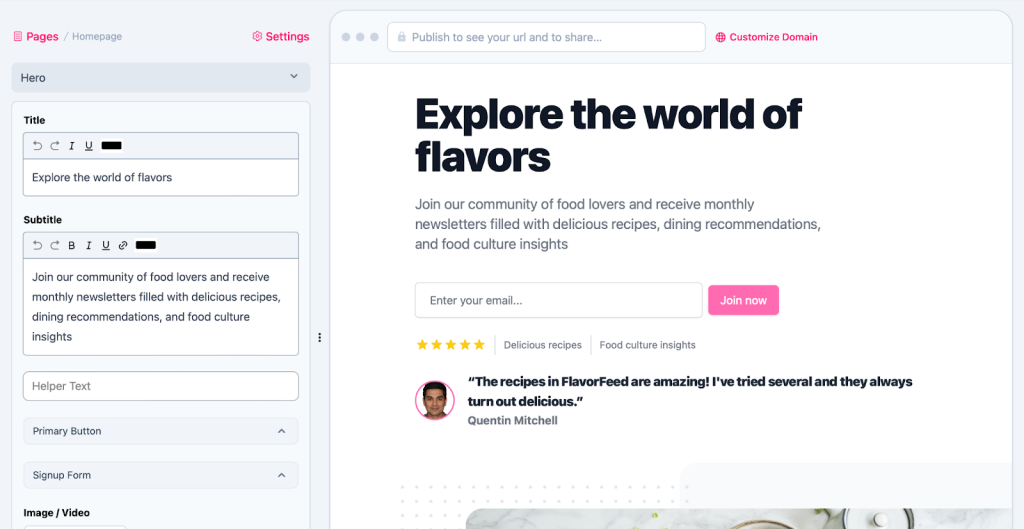
You can customize the site’s name, SEO title, and meta description on the Site Settings tool:
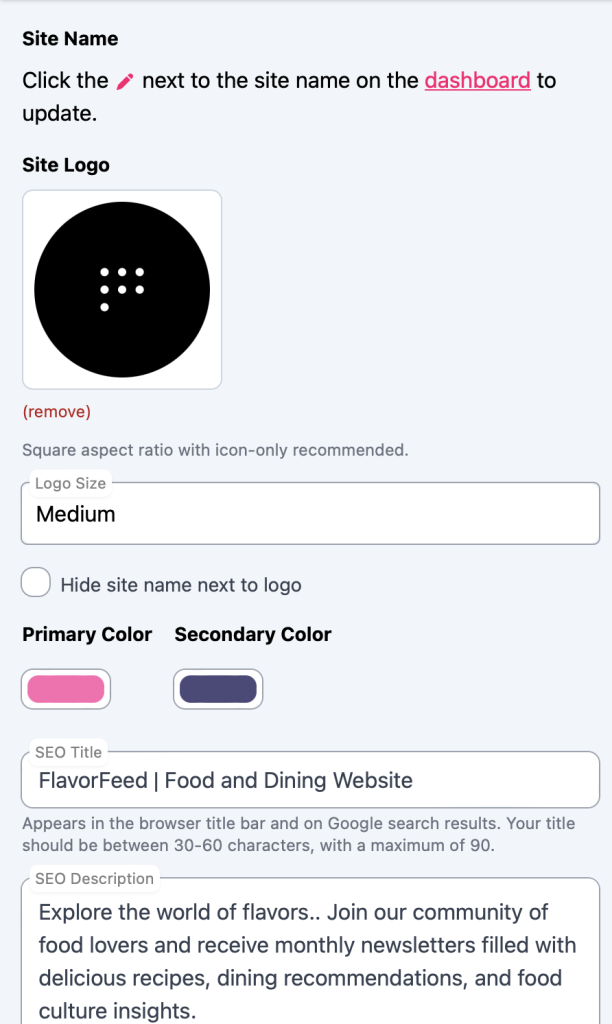
To integrate your Meta Pixel ID, Google Analytics 4, and Google Tag Manager account, select the Integrations tab:
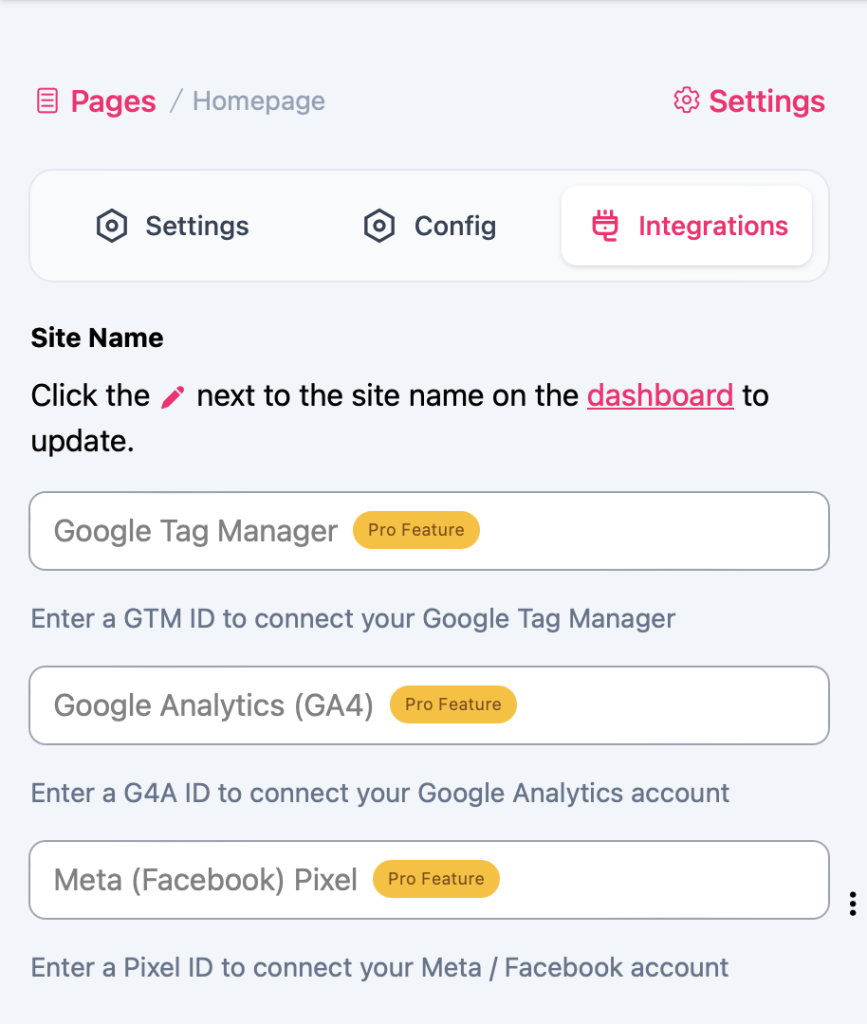
Mixo also supports adding AI-generated pages to your site like an About Us page, Product Page, Pricing Page, and more:
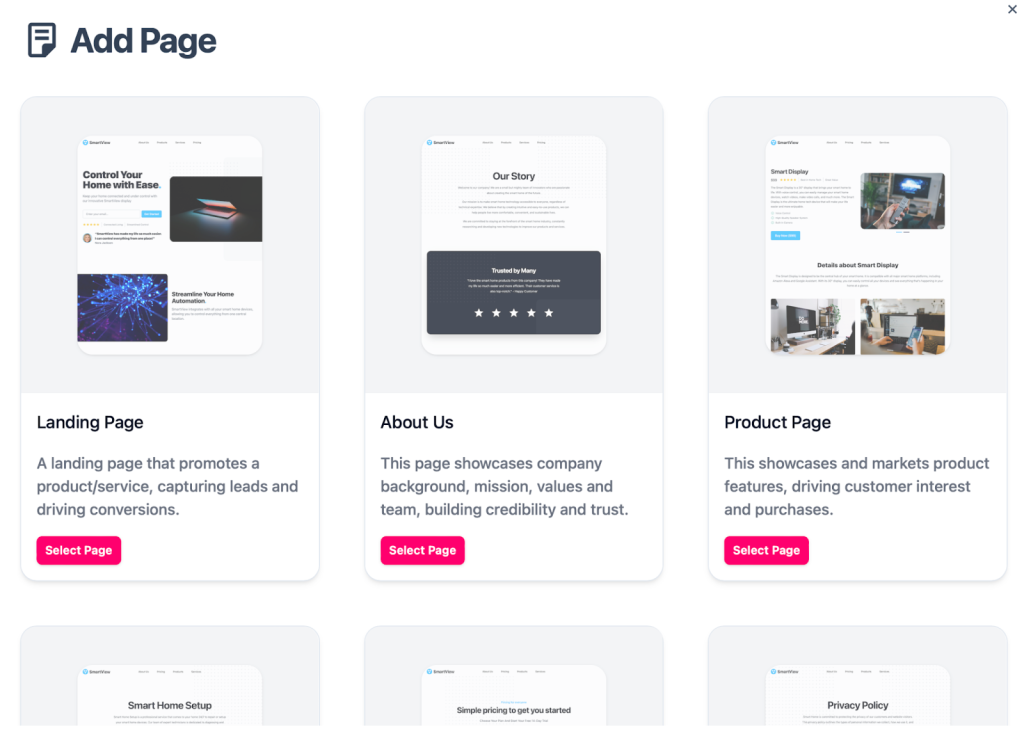
Once you’re finished customizing your site’s homepage, select Save to save all changes or Publish to make your site live. However, you must subscribe to Mixo’s Growth Site or Premium site plan to publish a site with multiple pages.
We liked this tool since it enables users to personalize various elements in their site. It’s user-friendly and allows you to get leads through signup forms. However, the feature would have been better if it supported more integrations.
Dashboard and Subscriber Management
Mixo’s dashboard will show you your created sites and their thumbnail. It also displays your recent subscribers, which you can download and export to other marketing tools to send personalized promotions and offers.
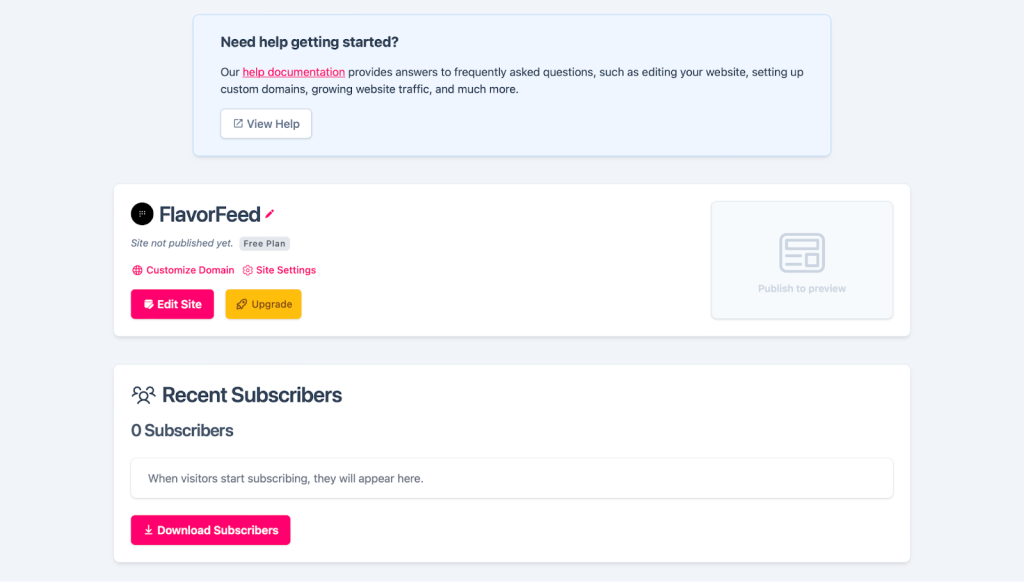
We found this feature excellent since it allows users to export their subscribers to other CRM, marketing, and subscriber management platforms.
Pricing
Mixo offers three pricing plans, each with increasing website pages and AI support:
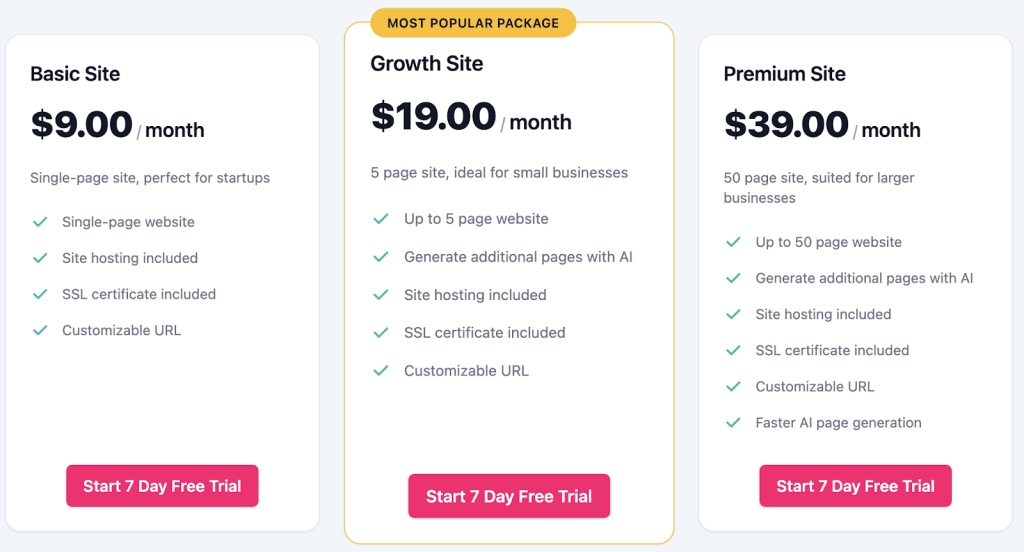
Basic Site
The Basic Site plan is ideal for startups and businesses needing only a single-page site. It starts at $9 per month or $7/mo. for annual billing. The plan offers website creation tools for a single-page website, site hosting, a customizable URL, and an SSL certificate.
Growth Site
The Growth Site plan is suited for small and mid-sized businesses. It costs $19 per month or $17/mo. when billed annually. The plan offers all features from the Basic Site plan, including AI-powered website creation for a 5-page site.
Premium Site
The Premium Site plan is ideal for large businesses that need multiple site pages. It starts at $39 per month or $29/mo. for annual billing. The plan includes all features on the Growth Site plan, supporting website creation of up to 50 pages and faster AI page generation.
Users signed up to Mixo can try the platform’s core features for free, including publishing your site to their servers. However, you can subscribe to a paid plan to customize your URL or publish sites with multiple pages. Mixo offers a seven-day free trial for all plans above.
Final Thoughts on Mixo
Mixo is a user-friendly AI website builder for creating landing pages and sites with simple functionalities. We liked its capability of creating a site within a few minutes using a detailed prompt. It also allows users to customize the site’s various elements, including its SEO title, meta descriptions, hero section, and more.
We gave it a 4.5/5 because of its ease of use, AI-assisted site creation, customer feedback, and subscriber management tools. However, it lacks tools for advanced site creation and app integrations.
We highly recommend this tool for businesses and startups that run beta testing for their software or pre-launch their products.
Frequently Asked Questions
Share This Post
Della Yang
Della Yang is a marketing professional with a passion for the ever-changing digital landscape. She frequently writes tech news and reviews, sharing her knowledge and insights through blogs and various online platforms.
Allow cookies
This website uses cookies to enhance the user experience and for essential analytics purposes. By continuing to use the site, you agree to our use of cookies.


![11 Best AI Website Builders for Every Need [2025]](https://cdn.sanity.io/images/isy356iq/production/23668ac08262c43eeafaee559b1fb26d05f9bb81-1200x800.jpg?h=200)
![ZipWP: Build a Functional WordPress Site in 60 Seconds with AI [2025]](https://cdn.sanity.io/images/isy356iq/production/77d93591b5a07e3c3cabed9a5207fe4093569531-1200x800.jpg?h=200)




![Uizard: Turn Ideas into UI Designs in Under a Minute with AI? [2025]](https://cdn.sanity.io/images/isy356iq/production/e93bbd89f87c53e973fd9a468629b64b73930f02-1200x800.jpg?h=200)